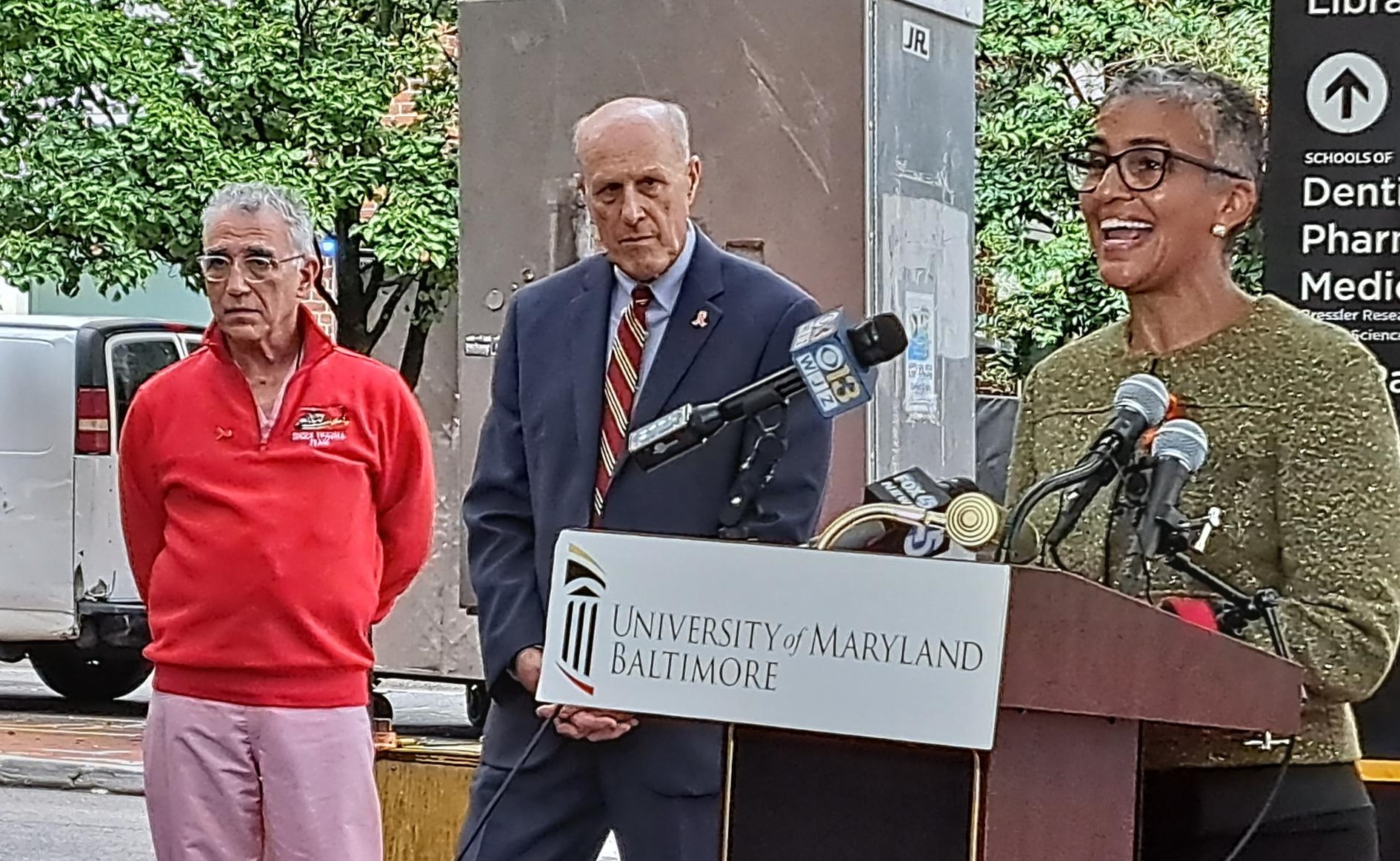Dean Renée Hutchins joins UMB President Bruce Jarrell and Shock Trauma Physician-in-Chief Thomas Scalea at a press conference announcing the new center
The University of Maryland Francis King Carey School of Law joins with colleagues at the University of Maryland, Baltimore (UMB) to form the new UMB Center for Violence Prevention. The center will be led by renowned trauma surgeon Thomas Scalea, physician-in-chief at the Adams Cowley Shock Trauma Center. UMB’s schools of medicine and social work are also partners in the endeavor.
“Our work in West Baltimore — one of the communities in the country with the most challenges — puts us in a unique position to take an interdisciplinary approach with experts already working in the community,” said UMB President Bruce Jarrell, speaking at a Sept. 6 news conference held at the corner of Penn and Lombard streets, across from Shock Trauma in Baltimore. “We can leverage the experts in the community, at our School of Social Work, School of Medicine, and Francis King Carey School of Law with those in Shock Trauma who deal with the aftermath of violence every day.”
Funded by a $2 million gift from Betsy Sherman and the Sherman Family Foundation, the center will bridge numerous research and clinical programs already in place at UMB that address violence and the social determinants of violence. With an interdisciplinary approach, the center will collaborate with communities, academic institutions, nonprofit organizations, governmental bodies, corporations, and philanthropic organizations to advocate for informed policies and interventions toward violence prevention and creating social justice for all. The center will establish community-based partnerships to conduct research, develop creative and impactful education, and advocate for policies that strengthen our communities to prevent violence and trauma.
Violence prevention and justice for survivors of violence have long been high priorities at the University of Maryland Francis King Carey School of Law. For nearly 50 years, the Clinical Law Program, which currently comprises 18 clinics and legal theory and practice courses, provides thousands of hours of free legal representation annually to some of the most vulnerable Maryland residents, many of whom have experienced unfathomable violence.
The law school also administers the UMB Rebuild, Overcome, and Rise Center (ROAR), which offers a one-stop-shop where survivors of violence in Baltimore City can turn for legal, social work, nurse care management, and therapy services. The center assists low-income folks who have experienced, among other crimes, sexual and physical assaults, intimate partner violence, human trafficking, and gun violence.
In 2020, the law school increased ROAR’s capacity by establishing the Justice for Victims of Crime Clinic in which student attorneys provide representation and legal advice for survivors of violence.
Moreover, for two decades, the Center for Dispute Resolution (C-DRUM), through its Mediation Clinic and School Conflict Resolution Education Program, has been supporting K-12 public schools throughout Maryland with peer mediation and restorative practices training and services for students, administrators, and teachers. Through research and advocacy, C-DRUM has helped to transform Maryland school discipline law to restorative and rehabilitative models, helping schools statewide reduce the overreliance on suspensions, which were not working and had inequitable results. Law students in the Mediation Clinic also provide mediation in courts and communities, empowering people with peaceful ways to resolve their conflicts.
More recently, C-DRUM launched the Levitas Initiative for Sexual Assault Prevention. Working under faculty supervision, law students have helped to develop and implement a sexual assault prevention curriculum grounded in a restorative justice framework in Baltimore City middle schools. The Levitas Initiative helps students identify, question, and reject the destructive ideas that give rise to sexual violence.
“As Maryland Carey Law’s new dean, I am excited to build on this important work,” said Dean Renée Hutchins. “And we are proud to have the opportunity to bring our expertise at the law school to bear on this interdisciplinary project with our UMB colleagues.”

